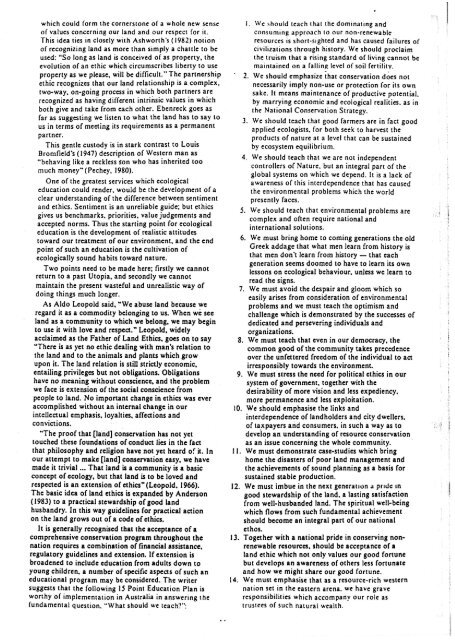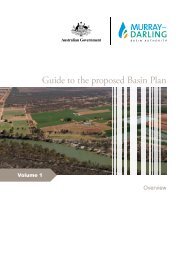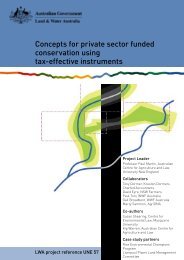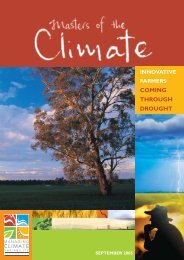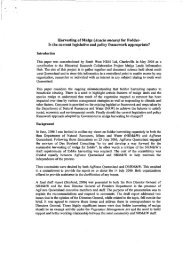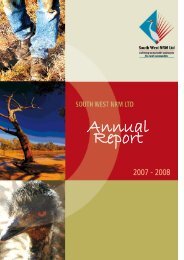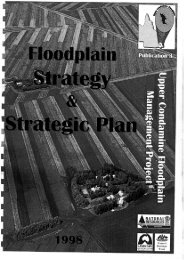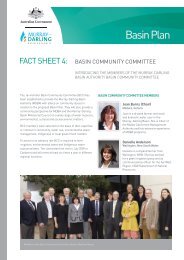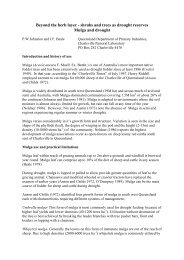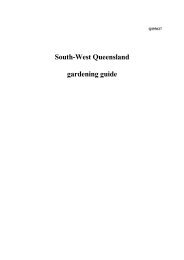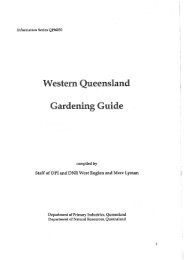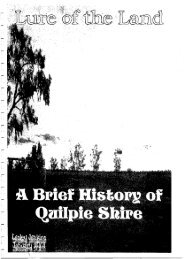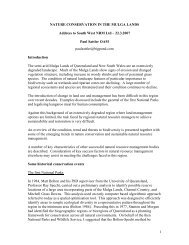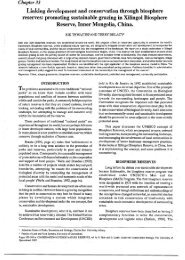soil-conservation-people-religion-and-land.pdf - South West NRM
soil-conservation-people-religion-and-land.pdf - South West NRM
soil-conservation-people-religion-and-land.pdf - South West NRM
Create successful ePaper yourself
Turn your PDF publications into a flip-book with our unique Google optimized e-Paper software.
which could form the cornerstone of a whole new sense<br />
of values concerning our l<strong>and</strong> <strong>and</strong> our respect for it.<br />
This idea ties in closely with Ashworth's (1982) notion<br />
of recognizing l<strong>and</strong> as more than simply a chattle to be<br />
used: "So long as l<strong>and</strong> is conceived of as property, the<br />
evolution of an ethic which circumscribes liberty to use<br />
property as we please, will be difficult." The partnership<br />
ethic recognizes that our l<strong>and</strong> relationship is a complex,<br />
two-way. on-going process in which both partners are<br />
recognized as having different intrinsic values in which<br />
both give <strong>and</strong> take from each other. Ebenreck goes as<br />
far as suggesting we listen to what the l<strong>and</strong> has to say to<br />
us in terms of meeting its requirements as a permanent<br />
partner.<br />
This gentle custody is in stark contrast to Louis<br />
Bromfield's (1947) description of <strong>West</strong>ern man as<br />
"behaving like a reckless son who has inherited too<br />
much money" (Pechey, 1980).<br />
One of the greatest services which ecological<br />
education could render, would be the development of a<br />
clear underst<strong>and</strong>ing of the difference between sentiment<br />
<strong>and</strong> ethics. Sentiment is an unreliable guide; but ethics<br />
gives us benchmarks, priorities, value judgements <strong>and</strong><br />
accepted norms. Thus the starting point for ecological<br />
education is the development of realistic attitudes<br />
toward our treatment of our environment, <strong>and</strong> the end<br />
point of such an education is the cultivation of<br />
ecologically sound ha bits toward nature.<br />
Two points need to be made here; firstly we cannot<br />
return to a past Utopia, <strong>and</strong> secondly we cannot<br />
maintain the present wasteful <strong>and</strong> unrealistic way of<br />
doing things much longer.<br />
As Aldo Leopold said, "We abuse l<strong>and</strong> because we<br />
regard it as a commodity belonging to us. When we see<br />
l<strong>and</strong> as a community to which we belong, we may begin<br />
to use it with love <strong>and</strong> respect." Leopold, widely<br />
acclaimed as the Father of L<strong>and</strong> Ethics, goes on to say<br />
"There is as yet no ethic dealing with man's relation to<br />
the l<strong>and</strong> <strong>and</strong> to the animals <strong>and</strong> plants which grow<br />
upon it. The l<strong>and</strong> relation is still strictly economic,<br />
entailing privileges but not obligations. Obligations<br />
have no meaning without conscience, <strong>and</strong> the problem<br />
we face is extension of the social conscience from<br />
<strong>people</strong> to l<strong>and</strong>. No important change in ethics was ever<br />
accomplished without an internal change in our<br />
intellectual emphasis, loyalties, affections <strong>and</strong><br />
convictions.<br />
"The proof that [l<strong>and</strong>] <strong>conservation</strong> has not yet<br />
touched these foundations of conduct lies in the fact<br />
that philosophy <strong>and</strong> <strong>religion</strong> have not yet heard of it. In<br />
our attempt to make [l<strong>and</strong>] <strong>conservation</strong> easy, we have<br />
made it trivial ... That l<strong>and</strong> is a community is a basic<br />
concept of ecology, but that l<strong>and</strong> is to be loved <strong>and</strong><br />
respected is an extension of ethics" (Leopold, 1966).<br />
The basic idea of l<strong>and</strong> ethics is exp<strong>and</strong>ed by Anderson<br />
(1983) to a practical stewardship of good l<strong>and</strong><br />
husb<strong>and</strong>ry. In this way guidelines for practical action<br />
on the l<strong>and</strong> grows out of a code of ethics.<br />
It is generally recogniscd that the acceptance of a<br />
comprehensive <strong>conservation</strong> program throughout the<br />
nation requires a combination of financial assistance,<br />
regulatory guidelines <strong>and</strong> extension. If extension is<br />
broadened to include education from adults down to<br />
young children, a number of specific aspeas of such an<br />
educational program may be considered. The writer<br />
suggests that the following 15 Point Education Plan is<br />
worthy of implementation in Australia in answering the<br />
fundamental question. "What should we teach?":<br />
I. l'e should teach that the dominating <strong>and</strong><br />
consuming approach to our non-renewable<br />
resources is short-sighted <strong>and</strong> has caused failures of<br />
civilizations through history. We should proclaim<br />
the truism that a rising st<strong>and</strong>ard of living cannot be<br />
maintained on a falling level of <strong>soil</strong> fertility.<br />
2. We should emphasize ihat <strong>conservation</strong> does not<br />
necessarily imply non-use or protection for its own<br />
sake. It means maintenance of productive potential.<br />
by marrying economic <strong>and</strong> ecological realities. as in<br />
the National Conservation Strategy.<br />
3. We should teach that good farmers are in fact good<br />
applied ecologists, for both seek to harvest the<br />
products of nature at a level that can be sustained<br />
by ecosystem equilibrium.<br />
4. We should teach that we are not independent<br />
controllers of Nature. but an integral part of the<br />
global systems on which we depend. It is a lack of<br />
awareness of this interdependence that has caused<br />
the environmental problems which the world<br />
presently faces.<br />
5. We should teach that environmental problems are<br />
complex <strong>and</strong> often require national <strong>and</strong><br />
international solutions.<br />
6. We must bring home to coming generations the old<br />
Greek addage that what men learn from history is<br />
that men don't learn from history - that each<br />
generation seems doomed to have to learn its own<br />
lessons on ecological behaviour, unless we learn to<br />
read the signs.<br />
7. We must avoid the despair <strong>and</strong> gloom which so<br />
easily arises from consideration of environmental<br />
problems <strong>and</strong> we must teach the optimism <strong>and</strong><br />
challenge which is demonstrated by the successes of<br />
dedicated <strong>and</strong> persevering individuals <strong>and</strong><br />
organizations.<br />
8. We must teach that even in our democracy, the<br />
common good of the community takes precedence<br />
over the unfettered freedom of the individual to act<br />
irresponsibly towards the environment.<br />
9. We must stress the need for political ethics in our<br />
system of government. together with the<br />
desirability of more vision <strong>and</strong> less expediency.<br />
more permanence <strong>and</strong> less exploitation.<br />
10. We should emphasise the links <strong>and</strong><br />
interdependence of l<strong>and</strong>holders <strong>and</strong> city dwellers,<br />
of taxpayers <strong>and</strong> consumers. in such a way as to<br />
deveiop an underst<strong>and</strong>ing of resource <strong>conservation</strong><br />
as an issue concerning the whole community.<br />
I I. We must demonstrate case-studies which bring<br />
home the disasters of poor l<strong>and</strong> management <strong>and</strong><br />
the achievements of sound planning as a basis for<br />
sustained stable production.<br />
12. We must imbue in the next generation ;I prde In<br />
good stewardship of the l<strong>and</strong>. a lasting satisfaction<br />
from well-husb<strong>and</strong>ed l<strong>and</strong>. The spiritual well-being<br />
which flows from such fundamental achievement<br />
should become an integral part of our national<br />
ethos.<br />
13. Together with a national pride in conserving nonrenewable<br />
resources. should be acceptance of a<br />
l<strong>and</strong> ethic which not only values our good fortune<br />
but develops an awareness of others less fortunate<br />
<strong>and</strong> how we might share our good fortune.<br />
14. We must emphasise that as a resource-rich western<br />
nation set in the eastern arena. we have grave<br />
responsibilities which accompany our role as<br />
trustees of such natural wealth.


